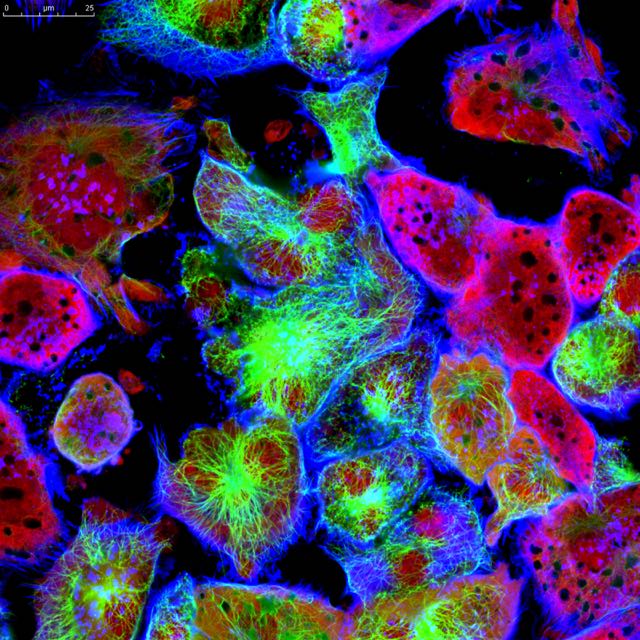A magazine where the digital world meets the real world.
On the web
- Home
- Browse by date
- Browse by topic
- Enter the maze
- Follow our blog
- Follow us on Twitter
- Resources for teachers
- Subscribe
In print
What is cs4fn?
- About us
- Contact us
- Partners
- Privacy and cookies
- Copyright and contributions
- Links to other fun sites
- Complete our questionnaire, give us feedback
Search:
Executable Biology
by Paul Curzon, Queen Mary University of London

Can a robot get cancer? Silly question. Our bodies are made of cells. Robots aren't. Cells are the basic building blocks of life and come in lots of different forms from long thin nerve cells that allow us to sense the world, to round blood cells that carry oxygen around our bodies. Cancer occurs when cells go rogue and start reproducing in an uncontrolled way. A computer can't get cancer, but you can allow virtual diseases to attack virtual cells inside a computer. Doing that may just help find cures. That is what Jasmin Fisher, who leads a research group at Microsoft Research in Cambridge, has devoted her career to.
Computational Modelling is changing the way the sciences are done. It is the idea that you can run experiments on virtual versions of things you are investigating. A computer model is essentially just a program that simulates the phenomena of interest. For example, by writing a program that simulates the laws of Physics, you can use it to run virtual Physics experiments about the motion of the planets, say. If your virtual planets do follow the paths real planets do, then you have evidence the laws are right. If they don't your laws (or the models) need to change. You can also make predictions such as when an eclipse will happen. If you are right it suggests the laws you coded are good descriptions of reality. If wrong, back to the drawing board.
Jasmin has been pioneering this idea with the stuff of life and death. She focusses on modelling cells and the specific ways that we think cancer attacks them. It gives a way of exploring what is going on at the level of the molecules inside cells, and so how well new medicines might, or might not, work. Experiments can be done quickly and easily on the programmed models by running simulations. That means the real experiments, taking up expensive lab time, can focus on things that are most likely to be successful. Jasmin's work has helped researchers design more effective actual experiments because they start with a better understanding of what is going on. One of the most important questions she is studying is how cells end up becoming what they are, and how this differs between normal cells and cancer cells. Understand this and we will be much closer to understanding how to stop cancer.


